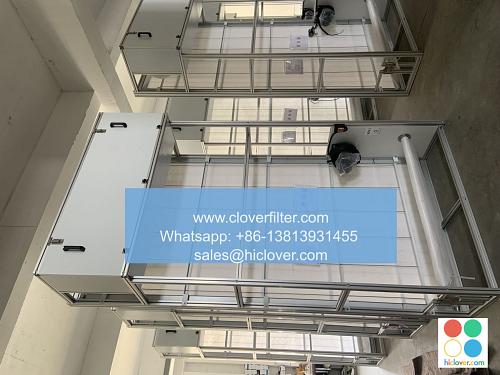Advancements in Automatic Roll Air Filters for Biopharmaceutical Production

The biopharmaceutical industry has witnessed significant advancements in recent years, driven by the need for improved efficiency, productivity, and product quality. One crucial aspect of biopharmaceutical production is the maintenance of a sterile and controlled environment, which is achieved through the use of advanced air filtration systems. This article will discuss the latest developments in automatic roll air filters, a critical component of biopharmaceutical production facilities, highlighting their key applications, operational benefits, and future prospects.
Introduction to Automatic Roll Air Filters
Automatic roll air filters are designed to provide high-efficiency air filtration and contamination control in biopharmaceutical production facilities. These filters utilize a rolling mechanism to advance a new filter media, ensuring a continuous supply of clean air and minimizing the risk of cross-contamination.
Advancements in Filter Technology
Recent advancements in automatic roll air filters have focused on improving filter efficiency, durability, and energy efficiency. Some notable developments include:
* Nanofiber filter media: Providing higher filtration efficiency and smaller pore sizes, nanofiber filters offer improved particulate removal and microbial control.
* Antimicrobial coatings: Reducing the risk of microbial growth and biofilm formation, antimicrobial coatings enhance the overall bioburden control of the filtration system.
* Smart sensor technology: Integrating sensors to monitor filter performance, airflow rates, and differential pressure, smart sensors enable real-time monitoring and predictive maintenance.
Application Areas in Biopharmaceutical Production
Automatic roll air filters have a wide range of applications in biopharmaceutical production, including:
* Compounding and filling: Providing clean air for aseptic processing and minimizing the risk of contamination.
* Lyophilization and freeze-drying: Ensuring controlled atmospheres and moisture control during the freeze-drying process.
* Cell culture and fermentation: Maintaining sterile conditions and optimal atmospheric control for cell growth and metabolic processes.
Operational Benefits
The implementation of automatic roll air filters in biopharmaceutical production facilities offers several operational benefits, including:
* Reduced risk of contamination: Minimizing the risk of microbial contamination and product spoilage.
* Improved product quality: Ensuring consistent product quality through controlled atmospheric conditions.
* Increased efficiency: Reducing filter replacement frequencies and minimizing downtime through predictive maintenance.
Future Prospects and Emerging Trends
The future of automatic roll air filters in biopharmaceutical production is promising, with emerging trends including:
* Integration with Industry 4.0 technologies: Leveraging artificial intelligence, machine learning, and Internet of Things (IoT) to optimize filter performance and facility operations.
* Development of sustainable filters: Focusing on eco-friendly materials and energy-efficient designs to minimize the environmental footprint of biopharmaceutical production facilities.
* Expanding applications in emerging therapies: Supporting the growth of cell and gene therapies, personalized medicine, and other emerging biopharmaceutical applications.
In conclusion, advancements in automatic roll air filters have significantly improved the efficiency, productivity, and product quality of biopharmaceutical production facilities. As the industry continues to evolve, the integration of emerging technologies and sustainable designs will play a crucial role in shaping the future of clean air technologies in biopharmaceutical production.

